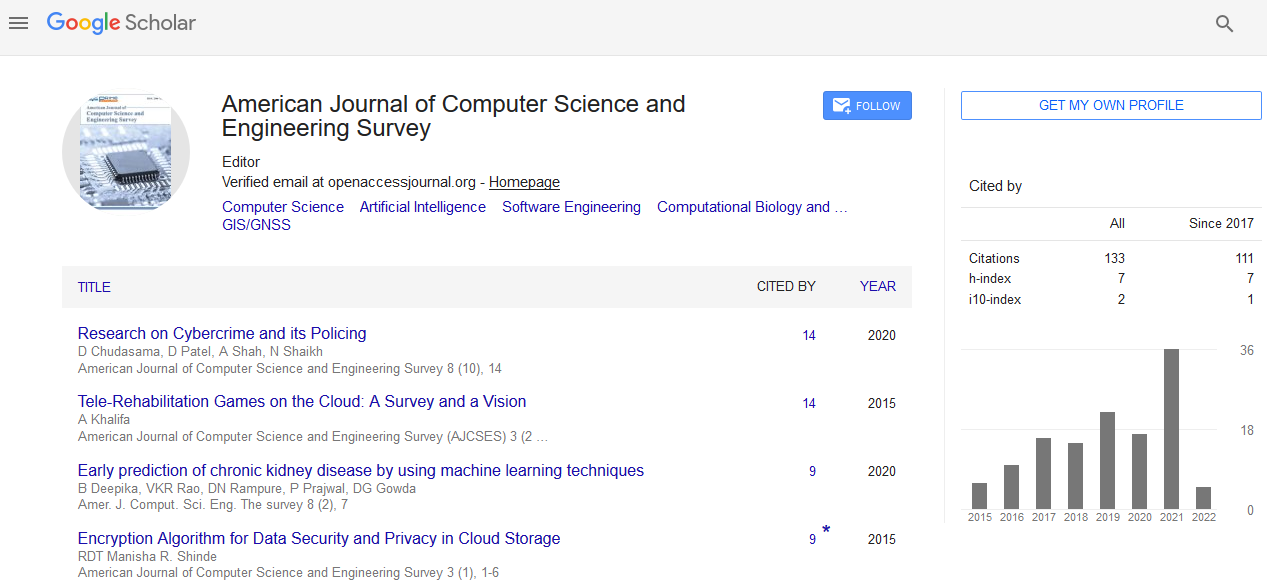Short Communication - (2024) Volume 12, Issue 1
Machine Learning in Health Informatics: Enhancing Healthcare through Data-driven Insights
Breanna Wills*
Department of Pharmaceutical Sciences, University of Arizona, USA
*Correspondence:
Breanna Wills,
Department of Pharmaceutical Sciences, University of Arizona,
USA,
Email:
Received: 28-Feb-2024, Manuscript No. IPACSES-24-19986;
Editor assigned: 01-Mar-2024, Pre QC No. IPACSES-24-19986 (PQ);
Reviewed: 15-Mar-2024, QC No. IPACSES-24-19986;
Revised: 20-Mar-2024, Manuscript No. IPACSES-24-19986 (R);
Published:
27-Mar-2024, DOI: 10.36846/2349-7238.24.12.09
Introduction
Health informatics, the intersection of healthcare and
information technology, has seen remarkable advancements
with the integration of machine learning techniques. Machine
learning algorithms enable healthcare providers to extract
valuable insights from vast amounts of data, leading to improved
diagnosis, treatment, and patient care. Machine learning (ML)
techniques have revolutionized the field of health informatics,
offering powerful tools for analyzing healthcare data, making
predictions, and improving patient outcomes. This paper
explores the machine learning process in health informatics,
from data collection and pre-processing to model development,
evaluation, and deployment. It discusses the applications of
machine learning in healthcare, including disease diagnosis,
personalized treatment planning, drug discovery, and public
health surveillance. Additionally, it highlights the challenges,
ethical considerations, and future prospects of integrating
machine learning into health informatics to enhance healthcare
delivery and management.
Description
The machine learning process in health informatics begins
with data collection from various sources, including electronic
health records (EHRs), medical imaging, wearable devices,
and genomic data. Preprocessing techniques such as cleaning,
normalization, and feature extraction are then applied to ensure
the quality and suitability of the data for analysis. Machine
learning models are trained on the preprocessed data to learn
patterns, relationships, and trends that can aid in healthcare
decision-making. Supervised learning algorithms, such as
support vector machines (SVM) and deep neural networks,
are commonly used for tasks like disease classification and
risk prediction. Unsupervised learning techniques, including
clustering and dimensionality reduction, are employed for
tasks such as patient stratification and anomaly detection.
The performance of machine learning models is evaluated
using metrics such as accuracy, precision, recall, and area
under the receiver operating characteristic curve (AUC-ROC).
Cross-validation techniques, such as k-fold cross-validation,
are utilized to assess the generalizability and robustness of
the models on unseen data. Machine learning has diverse
applications in health informatics, including: Disease Diagnosis:
ML algorithms analyze medical data to assist in the early
detection and diagnosis of diseases such as cancer, diabetes,
and cardiovascular disorders. Personalized Treatment Planning:
ML models predict optimal treatment plans and medication
dosages tailored to individual patient characteristics, genetic
makeup, and treatment history. Drug Discovery: ML algorithms
analyze molecular data to identify potential drug candidates,
predict drug-target interactions, and accelerate the drug
discovery process. Public Health Surveillance: ML techniques
analyze population-level data to monitor disease outbreaks,
identify epidemiological trends, and inform public health
interventions. The integration of machine learning into health
informatics presents challenges and ethical considerations,
including: Data Quality and Bias: Biases and inaccuracies
in healthcare data can lead to biased predictions and
erroneous conclusions, exacerbating healthcare disparities.
Interpretability and Transparency: The black-box nature of
some machine learning models raises concerns about their
interpretability and transparency, hindering their acceptance
and trustworthiness among healthcare professionals and
patients. Privacy and Security: The collection and sharing of
sensitive health data raise concerns about patient privacy and
data security, necessitating robust safeguards and encryption
mechanisms. Despite the challenges, the future of machine
learning in health informatics holds promise for advancing
personalized medicine, improving healthcare outcomes, and
reducing healthcare costs. Emerging trends such as federated
learning, explainable AI, and synthetic data generation offer potential solutions to address the challenges and ethical
considerations associated with machine learning in healthcare
[1-4].
Conclusion
In conclusion, machine learning has emerged as a powerful tool
in health informatics, offering unprecedented opportunities
to leverage data-driven insights for healthcare delivery
and management. By understanding the machine learning
process, applications, challenges, and ethical considerations in
health informatics, we can harness its potential to transform
healthcare and improve patient outcomes in the digital age.
Acknowledgement
None.
Conflict Of Interest
None.
References
- Pastena L (2014) Catenary-free electrification for urban transport: An overview of the tramwave system. IEEE Electrif Mag. 2(3): 16-21.
[Crossref] [Google Scholar]
- Li S, Mi C (2015) Wireless power transfer for electric vehicle applications. J Emerg Sel Top Power Electron. 3(1): 4-17.
[Crossref] [Google Scholar]
- Jang Y (2018) Survey of the operation and system study on wireless charging electric vehicle systems. Transp Res Part Emerg Technol. 95: 844-866.
[Crossref] [Google Scholar]
- Seriani S, Gallina P, Wedler A (2017) Dynamics of a tethered rover on rough terrain. Mech Mach Sci. 47: 355-361.
[Crossref] [Google Scholar]
Citation: Wills B (2024) Machine Learning in Health Informatics: Enhancing Healthcare through Data-driven Insights. Am J Comp Science. 12:09.
Copyright: © 2024 Wills B. This is an open-access article distributed under the terms of the Creative Commons Attribution License, which permits unrestricted use, distribution and reproduction in any medium, provided the original author and source are credited.

